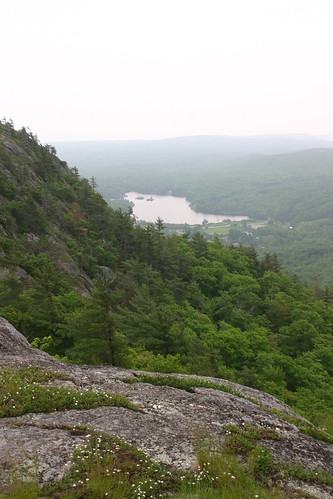Parks data causes concern
about money and kids

A view of Pamola Peak, Mt. Katahdin, Baxter State Park
The Portland Press Herald today provides a local view of the disgusting trend revealed earlier this summer in a study by The Nature Conservancy.

"The Bubbles" at Jordan Pond, Acadia National Park
PPH's Deirdre Fleming reports that the number of Baxter State Park visitors "declined from 75,000 to 56,000 in the five-year period that ended last year," and that the drop in revenue generated by usage fees may mean the Baxter visiting season gets "shortened to cut down on the cost of staffing the park." She added, "Attendance at Acadia dropped 20 percent during the same period, from 2.5 million to 2 million."
As MSNBC reports, these revenue shortfalls could have similar impacts nationwide.

These kids hate nature
The Nature Conservancy study was published in the July 2006 issue of The Journal of Environmental Management. Authors Oliver R.W. Pergams and Patricia A. Zaradic noted that:
We may be seeing evidence of a fundamental shift away from people’s appreciation of nature … to ‘videophilia,’ which we here define as ‘the new human tendency to focus on sedentary activities involving electronic media.’ Such a shift would not bode well for the future of biodiversity conservation.
Fleshing it out, they noted:
We have presented data suggesting that as sedentary recreation choices involving electronic media become more prevalent and the cost of motor vehicle ravel rises we may, unfortunately, predict further declines in per capita NPV.Wonderful news, eh? While I'm not prepared to enroll the young man in any kind of crash course in Luddite-ism, I suggest that this is another example of something that needs to be fought locally – as local as within our own families and among our circles of friends. For sure, the apple doesn't fall far from the tree, so it's likely our families and friends already share our views. But considering Ms. Fleming's reports about Baxter and Acadia visitorship, I'll pause before exempting Maine from the Nature Conservancy's castigation.If it is indeed true that people have changed their behavior, that they go to national parks less (at least in part) because they are more sedentary and use electronic media more, what does this mean for biodiversity conservation in general? There would seem to be at least two possible biodiversity conservation related viewpoints. One viewpoint might see declining per capita NPV, and the resulting reduced ecological pressure on our national parks, as being a good thing. An opposing viewpoint might see people’s apparent decrease in ‘biophilia’ and corresponding increase in ‘videophilia’ (which we here define as ‘‘the new human tendency to focus on sedentary activities involving
electronic media’’) as being a very bad thing indeed. [E. O.] Wilson[, in "Biophilia",., 1984. Biophilia. Harvard University Press] defined biophilia as ‘‘the innate tendency to focus on life and lifelike processes,’’ or the ‘‘innately emotional affiliation of human beings to other living organisms’’ (Wilson, 1984).According to Wilson we humans have an affinity for the natural world that has evolved over millennia and is part of our genes, just like our tendency to be territorial or to protect our young. [S.] Kellert, [in "The Value of Life: Biological Diversity and Human Society," Island Press, (1996)] described human cultural learning and experience as exerting a fundamental shaping influence on the content, direction, and strength of people’s nature-related values. Any shift in the value placed on natural areas and experiences will affect the value placed on biodiversity conservation. If we are indeed seeing a fundamental decline in people’s appreciation of (and attachment to) natural areas, the authors feel this does not bode well for the future of biodiversity conservation.
That said, I wonder how much of the visitorship drop-off relates to the jump in gas prices. Perhaps some study is in order to check the usage numbers at Maine's other State Parks. It's not such a concern if the folks who aren't visiting Baxter are instead visiting the outdoors. closer to home, in previously unexplored places in Western Maine, or something else entirely new.

Looking down on Hosmer Pond from Bald Mountain, in Camden
After all, our trip to Sugarloaf/Eustis Rangeley didn't seem fostered by or in service of anything like what is deemed "biophilia." And we weren't the only ones in Western Maine over the Fourth with "from away" appearance. I guess we need to see what the other outdoorsee places report at the end of the season before we should get too categorical with our pronouncements.
In the meantime, I'll see what I can do to push the suggestion (see the comment) offered by B. I'll float it to anyone I can find over at the Maine Bureau of Parks and Lands. I'm sure they'll be receptive.
3 Comments:
I didn't craft the first sentence of my response you linked to very well... Allow me to rephrase... What I meant to say: While I don't prefer TV to national parks, it doesn't surprise me that the typical American does.
I'm gonna go further than my last statement...
The transportation cost to get to national parks increasing, as is the cost of admittance to national parks. This is not the big factor, just a fact... But the cost of the time off for the normal employee is also greatly increasing. Think about it. The normal working American gets 2-3 weeks a year off if they are lucky, and it's increasingly rare for that time to be taken in larger chunks that going to many national parks require. The last three times I went to any major national park, it was on trips of no less than 2 weeks.
A possible reason for all this is the increasing competition in the local, national, and international job market. Where the US used to be the international big boys, the global economy is catching up and flattening according to some analysts. This may manifest itself in ways like making it harder than it previously was to enjoy the amazing things national parks have to offer.
Then there's the relative cheapness in cost and time to go farther and see other places via air travel. Where one can take two weeks off and Drive to see the Grand Canyon (not easy to fly there), you can fly to all sorts of exotic locals (I hear Nicaragua is nice this time of year).
And this doesn't even take into account the attention span problem afflicting increasing numbers of those in and after Generation X. I'm not sure they will ever appreciate national parks as a demographic.
But I'm partially of the school that the wider you pull back from an issue, it becomes more obvious that economic factors primarily at the helm.
12:05 PM
Agreed -- particularly on the travelling part. That's why I wonder if, say, Hoosier National Forest's hiking trails -- or the Wabash canoe corridor -- or the like, is witnessing any increase in usage as a consequence of folks' inability to travel far as often as used to be the case.
12:48 PM
There is a degree of hope, at least anecdotally. I work for an organization that offers volunteer opportunities and what the "industry" terms "enrichment" programs for kids 11-17 in Knox County. Every time we run a hiking club offering trips to explore Knox County's state parks and conservancy trails the program is over-subscribed (we are currently running two weekly hiking clubs this summer, both with waiting lists). Also, when the kids are invited to design their own service projects, trail clearance or making picnic tables for Land Trusts feature heavily on their idea lists. So there is at least a decent sized minority of adolecents who are wedded to both the playstation and the outdoors. Or perhaps that's just rural Maine.
And ultimately what did a trip to a national park mean for many folks back in "the golden age"? It certainly wasn't always hiking or mountain biking, canoeing or rock climbing: it was driving through scenery on a loop road or parkway. I suspect those of us like you and me who actually like to park the car and head into the woods have always been the minority. At my most devilish I'd suggest (especially after living on the edge of Acadia for 7 years and being married into a Bar Harbor family) that anything that lessens the pressure on these underfunded and over-loved resources might be a bonus. Does leave no trace extend to being content to know these places exist without tromping on tree roots?
The trouble is of course a question of continued funding. If folks can't be made to see that investment in one's country through paying one's taxes is a necessary evil for things like roads and schools, I wonder if they'll ever grasp the benefit of funding the preservation of lady slippers or peregrine falcons?
2:50 PM
Post a Comment
<< Home